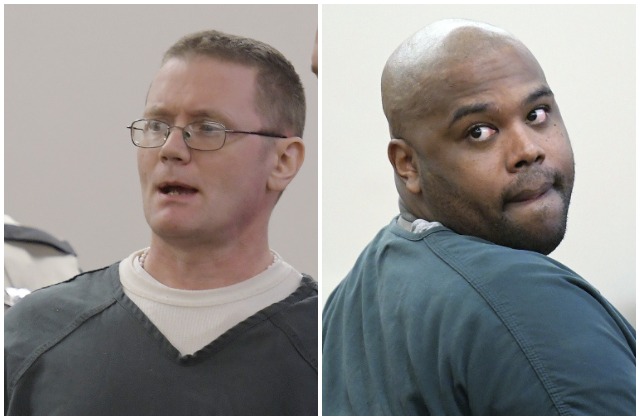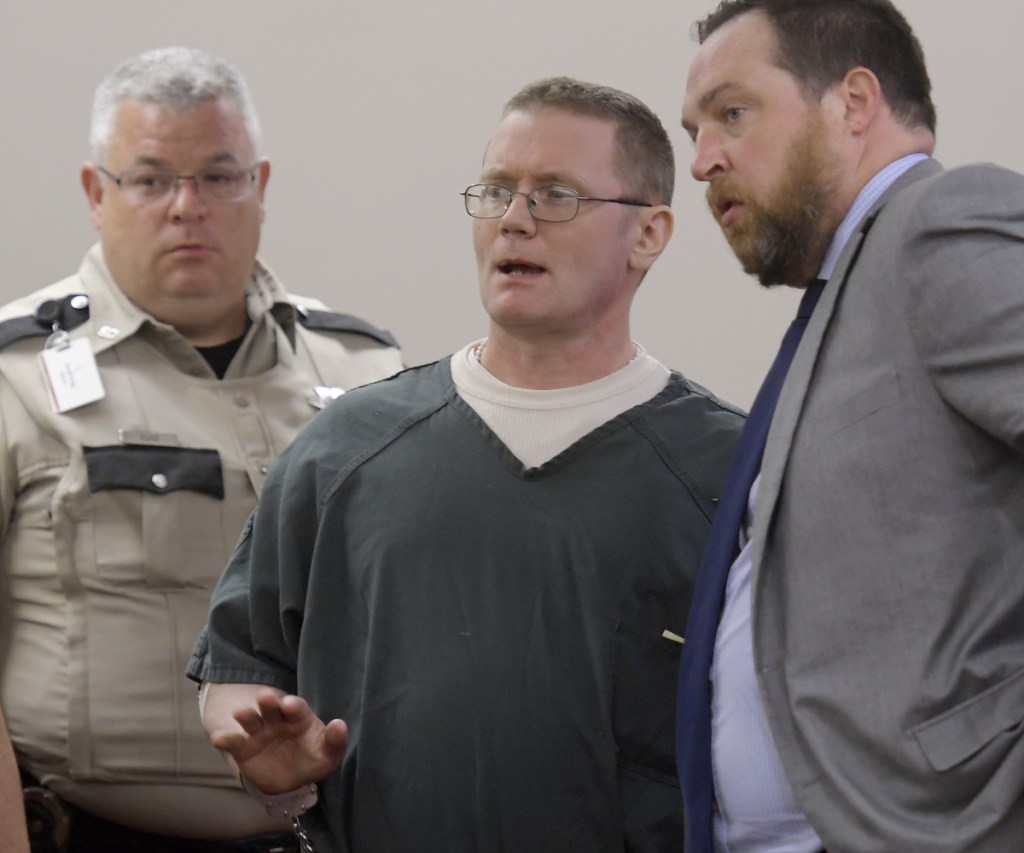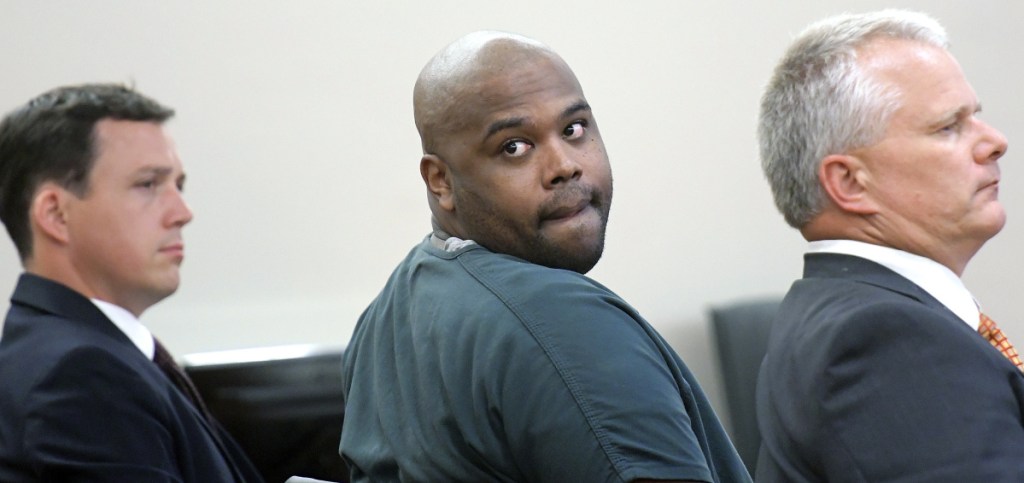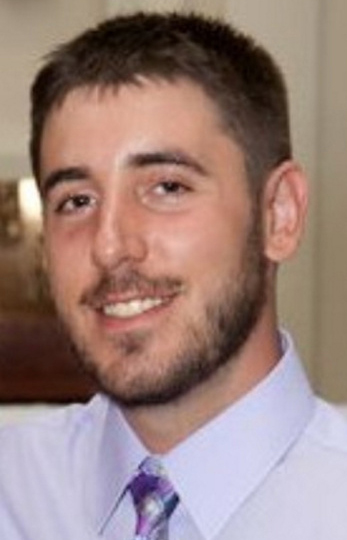AUGUSTA — The final two defendants were sentenced Monday for the Nov. 23, 2015, drug-related beating death of an Augusta man, with the state’s attorney saying the sentences reflected the defendants’ early cooperation in the investigation and their acceptance of responsibility.
Both Michael “Dirty” Sean McQuade, 47, of Augusta, and Damik “Doughboy” Davis, 28, of Queens, New York, had pleaded guilty 11 months ago to felony murder and robbery in the killing of Joseph Marceau and signed agreements with the state that spelled out their sentencing parameters.
Justice Daniel Billings imposed the sentences recommended by both sides.
McQuade was ordered to serve an initial 12 years in prison with an additional 13 years suspended while he serves four years of probation. McQuade had prior misdemeanor convictions.
Davis was ordered to serve an initial 20 years in prison with an additional 10 years suspended while he serves four years of probation. Davis had prior felony convictions.
A third man, Aubrey Armstrong, 29, of Far Rockaway, Queens, New York, who was convicted of felony murder and robbery after a non-jury trial, was sentenced on July 13, 2018, to 30 years in prison for felony murder and a concurrent 29 years for the robbery. At that time, Bruce Davis, a friend of Marceau’s dad, told Armstrong to “rot in hell” for the killing.
On Monday Bruce Davis repeated that sentiment with regard to Damik Davis: “With all due respect to the court, may he also rot in hell.”
But he didn’t say that for McQuade.
Assistant Attorney General John Alsop told Billings that the prosecution believed Davis’s role “was subservient to Mr. Armstrong, that he did not share the same intent that Mr. Armstrong had to bring about the death of Mr. Marceau, but it was clear that he was directly involved in some of the physical beatings.”
Marc Menard, Marceau’s stepfather, said if Marceau were still alive, “He would wonder why Mr. Davis, who was brought to Maine to act as a bodyguard for a drug dealer, would assist him to murder someone who posed no threat to him.”
Menard added, “We have lost our faith that there is humanity in the hearts of all people in this world.”
As Davis stood to talk to the judge, he also turned around and told Marceau’s family members he had no answers to their questions. He said he thinks about what happened every night.
“I just wish it never happened,” he said. “You shouldn’t forgive me. I hope I’ll be able to forgive myself one day; right now I can’t because somebody lost their life for something that was stupid. I just want to say I’m sorry to y’all. I’m sorry.”
His attorney, Stephen Smith, told the judge that “with Davis’s full assent and cooperation,” the defense’s private investigator located key evidence and a key lead on a witness for the state.
At Armstrong’s trial, witnesses testified that a group of people planned to rob Marceau, who was a drug user looking to sell some heroin to get some crack. Marceau was taken to McQuade’s former fourth floor apartment at 75 Washington St., and the beating began almost immediately.
Prosecutors said Marceau was punched, kicked and beaten with a survey stick and his head was stomped on. While he gave up the heroin almost immediately, the beating continued. Then his arms and ankles were tied.
One image projected on a desktop monitor at Armstrong’s trial showed Marceau on his back on a bedroom floor, his head bloodied and bruised and with what appeared to be a swollen nose, blackened eyes. One gash was clearly visible in the middle of his forehead. He was found unresponsive and without a pulse by Augusta police officers responding to a neighbor’s noise complaint.
Damik Davis answered the door when police knocked, and the officers saw another individual — whom the prosecution said was Armstrong — pass behind Davis from the bedroom toward a back exit,
Damik Davis fled as well, but was arrested nearby that night. McQuade was arrested about a week later, and Armstrong was arrested in New York in July 2016.
McQuade, who testified at Armstrong’s trial that he saw Armstrong beat Marceau to death, also was sentenced to a concurrent two years on a series of burglary, theft and burglary of a motor vehicle charges that occurred in October and November of 2015 before Marceau’s death.
McQuade testified that Armstrong wanted to rob Marceau of 5 grams of heroin he had been trying to market for several days and that McQuade and his girlfriend, Zina Fritze, accompanied Davis, Armstrong and Marceau to the apartment.
Fritze, who also was charged with murder, felony murder and robbery, committed suicide in jail shortly after pleading not guilty to those charges.
McQuade said he only knew Marceau for a few months and described him as “respectful, considerate and an overall good person.”
“My actions, however unintentional, led to his death. That is something that I will live with every day for the rest of my life.” He said he was “truly sorry” for his part
He also told the family, “The only thing I can offer I’ve already given with my testimony, and I hope that it has given you some satisfaction toward justice for Joe.”
He said he knew Fritze felt horrible as well about what happened and would have wanted to apologize also.
McQuade waved goodbye to his mother as he left the courtroom.
Marc Menard, Marceau’s stepfather, said that if his stepson was still alive, “He would wonder how Mr. McQuade and Ms. Fritze could turn their backs on him since Joey considered them both his friends.” Menard told McQuade, “We as a family will forgive Mr. McQuade for his unwitting role in Joey’s death.” Menard also said Marceau “did not know or understand the drug world that he had most recently been a part of” and that Marceau struggled with mental illness.
“Joey’s moral compass would never have allowed him to even consider violence against a human being.”
Menard said the family would forgive McQuade “for his unwitting role in Joey’s death.”
Bruce Davis, speaking on behalf of Marceau’s father, Gerard, who lives in Florida, told McQuade at the hearing that he would not forgive him for helping to slay his only son. “The sentence he is getting does not satisfy me. His real sentence will come on judgment day.”
Billings noted that while he indicated previously he did not believe all of McQuade’s testimony at the trial, he found him credible on some points and added, “He did play a significant role in Mr. Armstrong’s conviction for felony murder.”
In imposing sentence, Billings told McQuade, “The best thing that you can do to show the victim’s family that the remarks you made here today were genuine is to live your life differently than you did before the tragic events that brought us all here today.” Billings made similar remarks to Damik Davis.
Under Maine law, a person is guilty of felony murder if acting alone or with other persons, commits or attempts to commit a felony — murder, robbery, burglary, kidnapping, arson, gross sexual assault, or escape — and this causes the death of another person.
The state dismissed the murder charges —which carry a sentence of 25 years to life — against both Davis and McQuade at the sentencing hearings. No one was convicted of murder in Marceau’s death.
McQuade and Damik Davis were sentenced in back-to-back hearings Monday at the Capital Judicial Center in Augusta, in contrast to the hearing in Lincoln County Superior Court in which the guilty pleas to the felony murder and robbery charges were handled together.
Marceau’s family declined to speak to a reporter after the sentencing hearing.
Betty Adams — 621-5631
Twitter: @betadams
Comments are not available on this story.
Send questions/comments to the editors.






